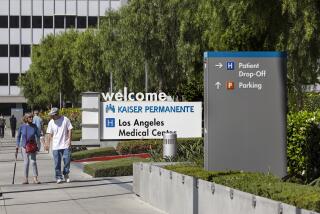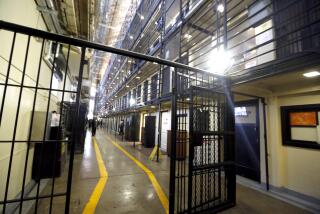Kaiser Halts Kidney Venture
Kaiser Permanente announced Friday that it was indefinitely suspending its kidney transplant program in Northern California after revelations that it had endangered hundreds of patients.
“I think, quite frankly, they searched their souls and they decided that it just was going to be very difficult to ensure that all the patients’ needs were met,” said Cindy Ehnes, director of the California Department of Managed Health Care. “They were trying to essentially fix the airplane while they were flying it.”
The decision, which Kaiser described as voluntary, followed reports in The Times last week detailing the problems that arose after the giant HMO forced up to 1,500 patients to move to its start-up program in the fall of 2004.
The patients had been treated in established centers at UC San Francisco and UC Davis, under contract with Kaiser.
At Kaiser’s new center in San Francisco, twice as many people died on the waiting list as received kidneys last year. The statewide pattern for transplant centers was the reverse: Twice as many patients received kidneys as died.
Hundreds of patients were not properly transferred from their old programs to Kaiser’s, leaving them in limbo with little hope of receiving new kidneys.
Friday’s decision to suspend the program appears to have been made in some haste, with reporters given about 10 minutes’ notice of the telephone briefing.
As recently as Wednesday, Kaiser officials had touted the program’s quality at a news conference, while apologizing for administrative blunders.
Now, Kaiser will send all of its patients back to the UC hospitals.
“We really felt that in order to ensure that our patients were absolutely getting the best care possible, at this point in time we really needed to suspend operations,” Mary Ann Thode, president of Kaiser Foundation Health Plan and Hospitals in Northern California, said in Friday’s call.
“We think we’re making the right decision and doing what we should be doing in this situation,” she added.
The move solves some problems but creates another: how to safely transfer a caseload now totaling more than 2,000 patients.
Before Kaiser launched its program in 2004, the HMO worked more than a year on a plan to move its patients from UC San Francisco and UC Davis. Even so, the transition was fraught with problems. More than 200 Kaiser patients were never properly shifted to the Kaiser program.
The reverse migration will essentially happen on the fly.
Neither Kaiser officials nor regulators could provide details Friday about the transition. Meetings are scheduled in the coming week to hash them out.
“There’s no plans in place,” said Dr. Stephen Tomlanovich, medical director of UC San Francisco’s renal transplant service. “Nor did they contact us to have an emergency meeting before this press conference.”
Dr. Richard Perez, chief of UC Davis’ transplant center, said he did not know the extent of Kaiser’s plans until being told by The Times.
“I think in the long run, it’s best for the patients,” he said. “They were being taken care of appropriately before [Kaiser took over their care], and it sounds like it’s going to go back to that.”
Kaiser’s Thode said the transplant program would continue to perform surgeries on willing patients until the shift was complete. She could not say when that would be.
During the transition, the HMO will also continue evaluating people who are willing to donate a kidney to a relative, she said.
One key issue is ensuring that patients do not lose their seniority on a waiting list, which determines the order in which they are to receive their transplants. In San Francisco, the typical wait for a new kidney is about six years.
Patient Darlis Beale, who has been waiting seven years, was initially surprised to hear of the HMO’s decision.
“Oh my,” she said. “Let me catch my breath.”
Later she wrote in an e-mail: “That transplant unit fell about as fast as Ferdinand Marcos and the Berlin Wall. It just caved in on the weight of lies and maltreatment that it gave to its patients.”
Beale, who sued Kaiser on Thursday, is on dialysis, a grueling process that removes impurities from the blood.
Karen Sorensen, whose 74-year-old mother, Corra Mayo, is on Kaiser’s list, was also pleased. Mayo had been at the top of the list at UC San Francisco in early 2004 but still has not received a transplant under Kaiser’s program.
“They were probably going to get shut down anyway, so this is just them voluntarily doing it themselves,” Sorensen said. “You can’t have this kind of a screw-up with this many peoples’ lives” and stay open.
The failure of the San Francisco transplant program is a setback for Kaiser, which had said that bringing transplants in-house would provide patients with coordinated care among physicians, labs, pharmacies and hospitals.
Instead, many patients experienced disarray -- and deteriorating health. They complained that relatives willing to be living donors were put off or inexplicably rejected. They said their calls were not returned and they sometimes received conflicting advice from their Kaiser doctors.
The Times reported Friday, for instance, that one Kaiser patient said his doctor handed him a telephone number, recommending that he seek a kidney in the Philippines rather than waiting to get one in the Kaiser program.
Kaiser members are part of a unique healthcare entity that runs both a health plan and a hospital system. Except in rare circumstances, members get their care from Kaiser hospitals and affiliated Permanente medical group doctors only.
Friday’s decision does not affect patients in Southern California, where members needing transplants are sent to outside hospitals with which Kaiser has contracts.
Though somewhat taken aback at the giant HMO’s move, officials at both UC hospitals said that they would make whatever accommodations are necessary for the returning Kaiser patients.
UC San Francisco already has discussed adding evaluation clinics to handle the influx and putting transfer forms on its website for patients to download and send in.
Tomlanovich said he is confident that his program can safely handle the Kaiser patients -- hundreds of whom were awaiting kidneys at UC San Francisco before 2004. The program, which already has 2,741 patients on its kidney waiting list, has eight kidney surgeons and four nephrologists -- kidney specialists -- compared with Kaiser’s two surgeons and one active nephrologist.
But, he added, the patients need to understand that “we can’t do it in 24 hours.”
Officials at the United Network for Organ Sharing, which oversees the national transplantation system, said they will be actively involved in the process. The network said previously that Kaiser did not provide adequate notice that it planned to transfer so many patients to its program in 2004 -- creating problems that delayed the transition.
Network spokesman Joel Newman said officials hope to learn from that experience.
“We’ll do everything that we can to ensure that the transfer is as quick and as efficient as possible,” he said.
Kaiser’s announcement makes it the third transplant program in California to close in recent months.
St. Vincent Medical Center in Los Angeles halted its liver program in September after officials admitted that in 2003, its doctors improperly arranged for a transplant to a Saudi Arabian national using an organ intended for a higher-priority St. Vincent patient. Staff members then falsified records to cover the situation up, officials have said.
UCI Medical Center in Orange shut down its liver program in November after The Times reported that 32 liver transplant patients died in 2004 and 2005 while the hospital turned down viable organs that could have saved some of them. For more than a year, the hospital had no full-time liver transplant surgeon to perform the operations.
But Kaiser’s program is many times larger than those.
“I have made a personal commitment that no patient will slip through the cracks,” said Ehnes of the managed care department, which plans to appoint a monitor to track the transition process. “Our paramount concern is for patient safety.” She is also insisting that Kaiser staff a 24-hour helpline for patients: (800) 390-3508.
The suspension of Kaiser’s program does not halt investigations by the state and federal governments, or Ehnes’ own agency, into its failures. The probes could bring severe financial penalties.
Asked whether the program could reopen, Thode said, “We don’t know at this point.”
Charles Ornstein may be reached at charles.ornstein @latimes.com and Tracy Weber at tracy.weber@latimes.com.
More to Read
Start your day right
Sign up for Essential California for news, features and recommendations from the L.A. Times and beyond in your inbox six days a week.
You may occasionally receive promotional content from the Los Angeles Times.






